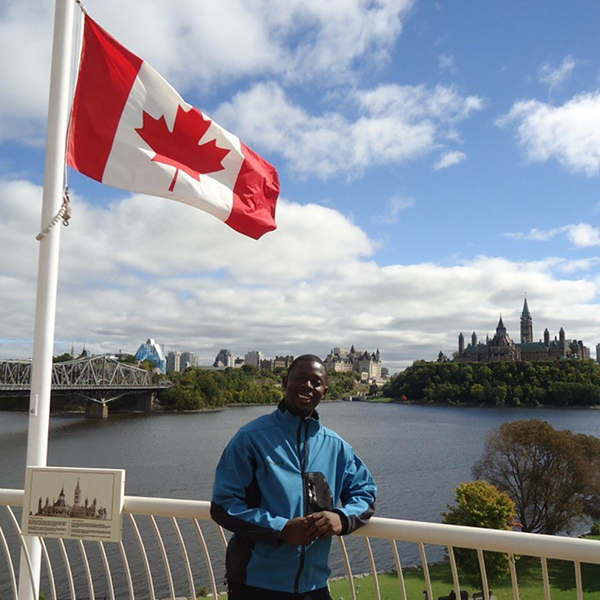Reaching the World from Los Angeles

Since its inception, the International Human Rights Center at Loyola Law School, Los Angeles has solidified its status as an important hub of human rights advocacy – providing generations of Loyola students the opportunity to change the world from its homebase in downtown L.A. The center’s recent success in helping client Karamo secure refugee status illustrates why.
The IHRC first encountered Karamo in 2010 while he was imprisoned in Quito, Ecuador after being arrested for travelling with a false passport while fleeing dangerous conditions in Guinea, where his parents were brutally murdered. At the time, he was en route to Canada, where he intended to seek protection.
The IHRC took on his case. It ultimately filed a communication with the United Nations Human Rights Committee. Nearly six years later, it received an opinion: that Ecuador had violated his rights under the International Covenant on Civil and Political Rights, ordering it to: compensate Karamo for his unjust incarceration; expunge Karamo’s criminal record in Ecuador; and take steps to ensure similar violations do not occur again.
As a result of the IHRC’s work, Karamo was ultimately released from prison. The IHRC helped him secure his refugee status earlier this year, enabling him to resettle in Canada, where he now lives. “All the credit goes to several generations of students. It was a relay marathon, with multiple briefs and replies exchanged with the Ecuadorian government over more than six years,” says Professor Cesare Romano, founder of the IHRC.
On the heels of their success with Karamo, IHRC students and attorneys secured a favorable ruling in March from the U.S. Committee on Economic, Social and Cultural Rights in a challenge to the key law regulating assisted reproductive technology in Italy. The case was filed in support of an Italian couple who sought help from a private clinic specializing in reproductive technology.
The IHRC and other advocates successfully argued that Law 40/2004 violates the International Covenant on Economic, Social and Cultural Rights. The ruling is expected to be far-reaching. “Before this, only the European Court of Human Rights had discussed cases regarding human embryos and reproductive rights,” said Romano. “This one, being decided by a U.N. body, has global impact.”
More cases are in the works. “In the clinic we have 12 cases pending against Jamaica, one against Guatemala, three against the United States and another against Italy,” says Romano. Many of the IHRC’s students have contributed to Loyola’s Inter-American Court of Human Rights Project, which produces and publishes detailed summaries of cases rendered by the Inter-American Court.
One of the 20-plus live-client clinics that comprise the Loyola Social Justice Law Clinic, the IHRC focuses on providing a range of experiential opportunities for its students, who are charged with research, brief drafting and cultivating an intense understanding of international law.
“The clinics provide something for everyone,” says Romano. But for those interested in doing work that cuts across cultures, the IHRC provides “an important lesson for our students to be able to reach out and broaden their horizons beyond the borders of the United States and understand that they can make a difference here or thousands of mile away.”
Rooted in the Law School's values and tradition of social justice, academic freedom, personal integrity and professional ethics, the overarching mission of IHRC is to contribute to the attainment of the fullest exercise of human rights by all human beings throughout the world. While students work on all stages of an individual case or engage in advocacy efforts on particular thematic issues, they learn how to conceptualize and strategize diverse approaches and grapple with practical, ethical, methodological and theoretical challenges involved. Through the clinic, Loyola's students have the opportunity to expand their perspectives and reach the world from Los Angeles.
Hear directly from IHRC’s faculty and students about why the work they do matters. Learn more about our International Human Rights Center or apply by April 5, 2019!